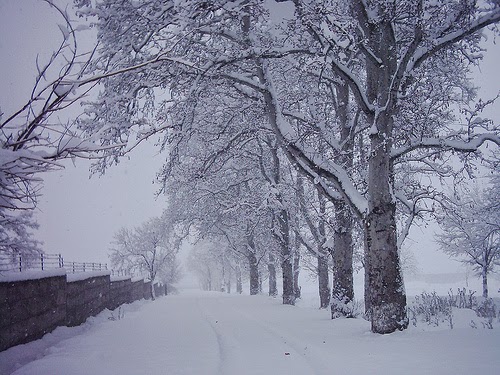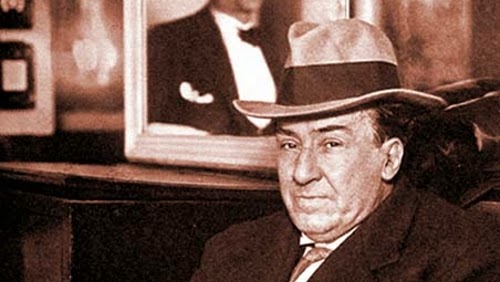The Snow Man
One must have a mind of winter
To regard the frost and the boughs
Of the pine-trees crusted with snow;
And have been cold a long time
To behold the junipers shagged with ice,
The spruces rough in the distant glitter
Of the January sun; and not to think
Of any misery in the sound of the wind,
In the sound of a few leaves,
Which is the sound of the land
Full of the same wind
That is blowing in the same bare place
For the listener, who listens in the snow,
And, nothing himself, beholds
Nothing that is not there and the nothing that is.
~
I first read “The Snow Man” in a high school English class, and it is my understanding that this is when it often gets read by everyone. Wallace Steven (1879-1955) is, of course, part of the overly lauded canon, so I believe we did a general survey on him, his contributions to Modernism, and we were expected to love and appreciate every aspect of that genius. Naturally, I hated him.
 However, when I read, “One must have a mind of winter,” the first line of the first of five tercets, I developed a new appreciation. In this line I was removed, relegated to a “one,” stateless and, when instructed to adopt a “mind of winter,” refreshingly. I hate winter as a rule, but the passivity of the phrasing “one must” was an order to adopt it with no expectations.
However, when I read, “One must have a mind of winter,” the first line of the first of five tercets, I developed a new appreciation. In this line I was removed, relegated to a “one,” stateless and, when instructed to adopt a “mind of winter,” refreshingly. I hate winter as a rule, but the passivity of the phrasing “one must” was an order to adopt it with no expectations. In fact, this is the point of the poem: our expectations of something keep us from truly seeing it for what it is. As much I hate winter, winter does not hate me and the “misery in the sound of the wind” is just “the sound of the land / Full of the same wind.” However, by choosing winter, the poem asserts that this true-seeing, this adopting of an objective cold mind, is inhuman at best. Who wants “to have been cold for a long time,” just to “behold the junipers spruced with ice”?
There’s something nihilistic in this kind of stark objectivism that Wallace Stevens, even though he’s instructing us otherwise, acknowledges in the last stanza. In this way this can be read as a brilliant strike against the Romantics, but also something serene. Almost in keeping with Eastern Taoism, Stevens asserts that “nothing” is a force, or lack of force, that must be acknowledged since it makes the world work. The absence in a bowl allows the bowl to be filled, says the Tao. The absence of a mind, allows the mind to be anything, even winter. The ambiguity of whether or not this is a good thing shows the brilliance of “The Snow Man.”
— Maxton Young-Jones
Maxton Young-Jones is a senior studying dramatic literature. He is the recipient of the 2013 Claeyssens Prize for Dramatic Writing and is currently writing a play with Nicole Cunningham for the Civil War commission given to GWU by Arena Stage.
 However, when I read, “One must have a mind of winter,” the first line of the first of five tercets, I developed a new appreciation. In this line I was removed, relegated to a “one,” stateless and, when instructed to adopt a “mind of winter,” refreshingly. I hate winter as a rule, but the passivity of the phrasing “one must” was an order to adopt it with no expectations.
However, when I read, “One must have a mind of winter,” the first line of the first of five tercets, I developed a new appreciation. In this line I was removed, relegated to a “one,” stateless and, when instructed to adopt a “mind of winter,” refreshingly. I hate winter as a rule, but the passivity of the phrasing “one must” was an order to adopt it with no expectations. 






